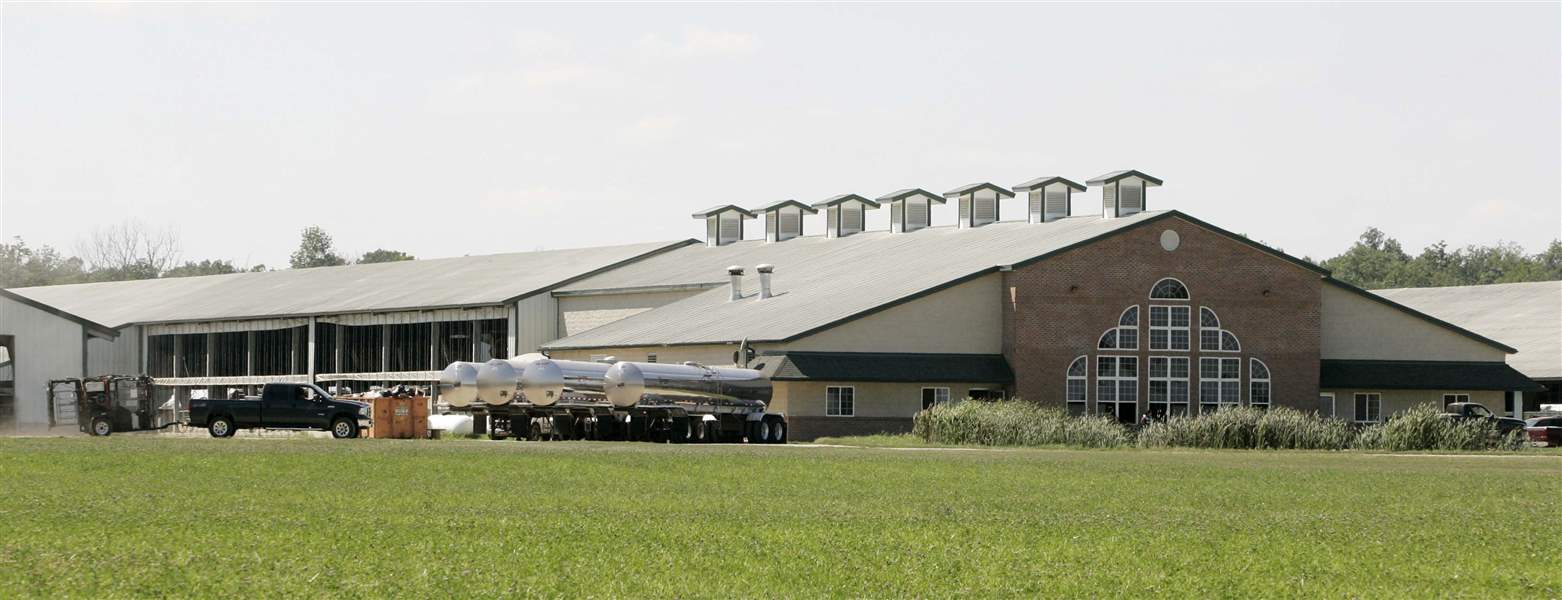
Lender gets title to big Vreba-Hoff farms in Michigan
11/18/2010
Vreba-Hoff 2 on South Meridian Road near Hudson, Mich., was among the farms that drew many environmental complaints.
The Blade/Dave Zapotosky
Buy This Image
HUDSON, Mich. - Three megadairies in southeast Michigan have been transferred away from the financially beleaguered Wauseon company that developed them more than a decade ago.
Rabo AgriFinance Inc. informed Michigan environmental officials last week that it had, through a wholly owned subsidiary, Southern Michigan Dairies LLC, obtained title to Vreba-Hoff Dairy I and II, near Hudson, and the nearby Waldron Dairy.
Under their new ownership, the three dairies along the Lenawee-Hillsdale county line have consolidated their remaining 3,000 cows into a single location - the Vreba-Hoff II site in Hillsdale County's Wright Township - leaving the other two facilities vacant, said Nicole Zacharda, with the Michigan Department of Natural Resources and Environment.
Rabo has petitioned state environmental officials to transfer the operating permits for the megadairies from Vreba-Hoff to Southern Michigan Dairies.
Rabo filed foreclosure documents last month in U.S. District Court in Grand Rapids, Mich., against a subsidiary of Wauseon-based Vreba-Hoff Dairy Development LLC seeking repayment of more than $55 million in allegedly defaulted loans.
State officials said and a spokesman for Vreba-Hoff confirmed that the ownership transfer was part of a settlement agreement of the foreclosure case.

Vreba-Hoff 2 on South Meridian Road near Hudson, Mich., was among the farms that drew many environmental complaints.
"We had dialogue with Rabo [AgriFinance], and they've assumed operational control of the farms," Vreba-Hoff spokesman Cecilia Conway said. "We still remain in dialogue with Rabo, and it's been a cooperative relationship."
Ms. Conway said the settlement agreement was "confidential" and declined to disclose the details of the agreement beyond saying that it did not involve any Vreba-Hoff property outside of Michigan.
Documents filed with the state indicate that the transfer involved more than 45 parcels of land in and around the megadairies.
In October, Michigan environmental authorities filed a $580,000 lien against the two larger Vreba-Hoff dairies after the Wauseon-based company allegedly failed to pay an agreed-upon settlement in a 2003 environmental case.
The lien is still recorded against the properties and the state has not been paid, Ms. Zacharda said.
The Vreba-Hoff I and II farms were built in the late 1990s by the founders of Vreba-Hoff Development, and at one time had more than 5,500 milking cows on the two sites along U.S. 127.
The Waldron dairy was purchased by Vreba-Hoff three years ago, and had 700 cows, Ms. Conway said.
She said Vreba-Hoff was "just happy that the farms will remain in operation," and that at least some of what was at one time about five dozen employees still will have jobs.
Todd Gurley, a spokesman for Rabo AgriFinance, did not return calls seeking comment Thursday.
The megadairies had several run-ins with state environmental authorities, who took issue with how the operations dealt with manure.
The farms were cited for environmental violations several times and incurred hundreds of thousands of dollars in fines and penalties, as well as other litigation.
Nevertheless, the Vreba-Hoff I and II facilities were used as showcases by Vreba-Hoff to show European dairy farmers, mostly from the Netherlands, how they could increase their profits exponentially by leaving Europe to start huge dairy operations in the Midwest - primarily in Michigan, Ohio, and Indiana.
Dozens of Dutch farmers bought into the dream and employed Vreba-Hoff Development LLC to help them locate, build, and equip their new facilities.
But their dreams went sour in 2009 as milk prices crashed to levels of decades ago, sending many of the dairies developed by Vreba-Hoff into bankruptcy protection.
Dairies across the country were being squeezed on all ends. Even as milk prices fell, the cost of corn, soybeans, and other feed - as well as fuel - kept rising.
Federal formulas based on supply and demand of the product are supposed to stabilize milk prices, but the weak economy for the past two years led prices to drop by a third to half.
Wholesale prices have rebounded somewhat from a year ago, when one local expert pegged dairy farmers overall with losses equivalent to $50 to $200 a month for each cow they owned.
Contact Larry P. Vellequette at:
lvellequette@theblade.com
or 419-724-6091.